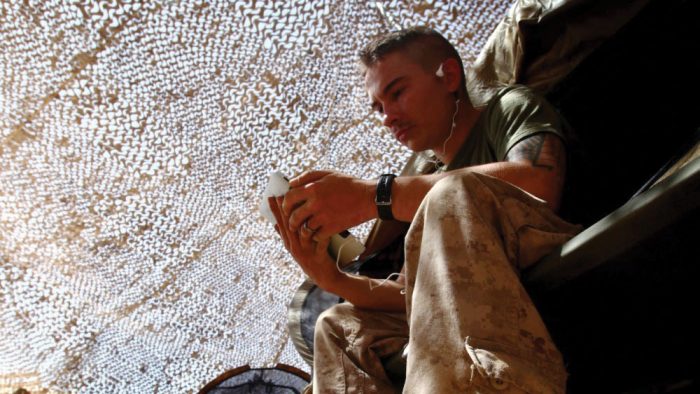 Humanities
Humanities
My Music, My War

The 2001 song “Bodies,” the signature hit of the heavy metal outfit Drowning Pool, refers to the slam-dancing crowds inspired by the band’s hard-driving music:
“Let the bodies hit the floor. Let the bodies hit the floor. Let the bodies hit the . . . floor!”
Punctuated with screams and shouts, the tune became an anthem of war for US troops in Iraq and Afghanistan, blaring through headphones and speakers as they prepared for combat. But not in the context that you might expect.
Troops didn’t choose the song because they were all Rambo-like fighters exploding with aggression and ravenous for battle. Quite the opposite.
“Many often felt scared, vulnerable, insecure, tired or lacking in motivation as they geared up to leave the wire,” Lisa Gilman, a folklore and English professor, writes in her new book, My Music, My War: The Listening Habits of US Troops in Iraq and Afghanistan. “Part of the experience of war was that a person had to be confident, controlled and dominant—to be otherwise could cost one one’s life and put others in danger.”
Song as survival: That was one of the powerful discoveries for Gilman, who studied the music habits of US troops in wartime.
Frustrated by what she saw as a generalization of troops by the media, Gilman wanted to humanize the experience of war and explore its impacts on those who serve.
That’s not as easy as just asking troops to talk about it; such emotional memories are often deeply personal. Troops are trained to avoid interviews and to sidestep commenting on conflict, which is inherently politicized and often divisive.
Music gave Gilman an inroad for profound conversations, while being respectful of the people she talked with by allowing them to control what they shared.
“Because music is so tied to memory neurologically and experientially, asking veterans about musical listening was a highly effective way to evoke memories of their war experiences,” Gilman said. “Think about it this way: If I asked you what music you listened to as a child, your answer would likely include many stories beyond what songs your parents played during your youth.”
She quickly found that talking to troops about their music inspired them to reveal much more than what was on their iPods.
Whether it was metal by Metallica or the rap of Lil Jon, Gilman found that troops almost uniformly turned to music to transform their mental state into what was needed for the job at hand. “I was a completely different animal,” one fighter told Gilman. “You have to be.”
But troops also shared stories as varied as their playlists.
One man effectively portrayed to Gilman how hard it was to be away from his family, describing his choice to replace Coldplay and Radiohead with the Beatles for his second deployment. “I thought it would be a little more happy,” he said—the soundtrack of his first tour was “not the type of music that was going to keep me alive.”
“In war, no one escapes fear, domination, violence, isolation, pain and loss,” Gilman writes, in My Music, My War. “Through music, combat veterans remember and sometimes forget, process and hopefully heal.”
One of her most powerful vignettes concerns the plight of a veteran named Keith, who suffered from post-traumatic stress disorder.
Keith was sitting in front of his computer with a gun in his lap and his finger on the trigger when he heard “Support Us,” a song by Soldier Hard, a veteran who uses music to share his own mental health struggles. The musician has recorded songs such as “Road to Recovery” and “Dear PTSD” to raise awareness and help troops cope.
After playing “Support Us” on repeat for hours, Keith put the gun down. “I’m not alone going through this,” Keith says, in My Music, My War. “If he can find a way to do this, I can, too.”
—Emily Halnon
Photo credit: Cpl. James Clark


 Twitter
Twitter Facebook
Facebook Forward
Forward